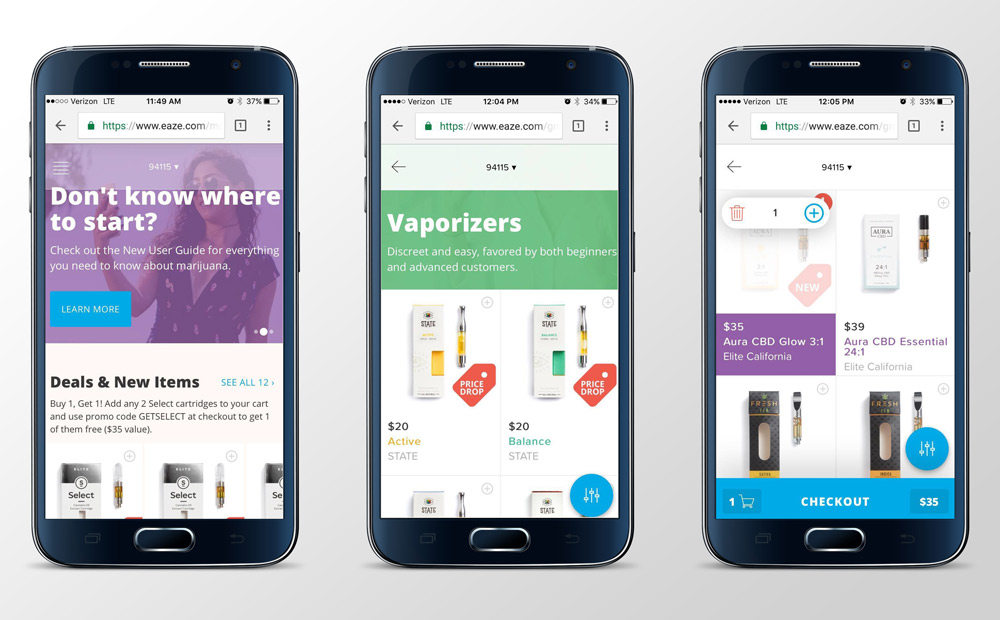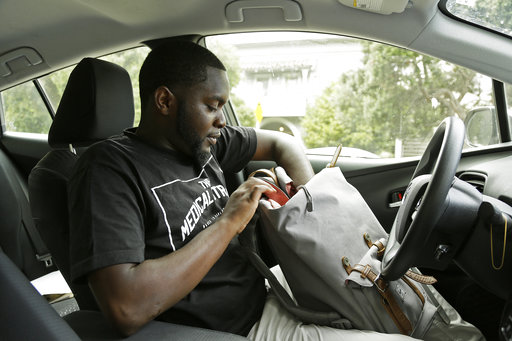Eaze’s e-commerce platform is meant to feel familiar.
Scrolling horizontally and vertically through product pictures is practically Netflixian. Refining results with tag-based filtering borders on the Amazonic. And when a click of a button turns results into ordered products hitching a ride to a front door, it’s a little Uberish.
Eaze’s software facilitates medical marijuana deliveries in California by connecting patients to dispensaries that sell and then deliver the products.
The burgeoning San Francisco-based startup — which hauled in $27 million in investment capital on Thursday — is among a growing class of tech companies and marijuana industry insiders who predict that dispensaries will go the way of Blockbuster Video as the Golden State begins legal recreational marijuana sales in 2018.
“It’s not unique to cannabis,” Sheena Shiravi, head of Eaze’s public relations, told The Cannabist. “I think that (e-commerce) is the wave of the future.”
Eaze and its cohorts are banking on California serving as the epicenter for an e-commerce cannabis revolution. They’re buoyed by language in marijuana regulations passed last June that say dispensaries are not required to have a storefront.
Designed to unify the state’s existing medical marijuana regulations with those for forthcoming recreational sales, Senate Bill 94 blasts open the doors for more virtual operations, said Hezekiah Allen, executive director of the California Growers Association (CGA). A cannabis retailer can have a discreet licensed and regulated facility out of which to conduct deliveries.
Industry forecasts peg California’s legal cannabis sales at about $2.8 billion for 2017, climbing to $6.6 billion by 2025 as the recreational marijuana market matures, according to a recent report by New Frontier Data, a cannabis data analytics firm. New Frontier highlights California’s marijuana delivery services as an area with “significant potential for expansion.”

The growth of e-commerce should be “very, very explosive,” New Frontier’s executive vice president of industry analytics John Kagia said last week during a webinar presenting the report “Cannabis On-Demand: Evolving Trends in California’s Medical Market” to investors, business operators and researchers.
“California is going to be the most important and the largest single market in the world (for the cannabis industry),” he said.
Beyond California’s sizable population and economic power, the state’s prowess in areas such as technology, media and cannabis cultivation “will be accelerants to the modernization, the increased sophistication and the maturation of the industry,” Kagia said.
Hodgepodge of delivery rules
The state is the country’s oldest medical marijuana state, and its loose regulation of that market has led to a patchwork of legality for on-demand delivery.
Regions of California, notably the San Francisco Bay Area, have allowed for the delivery of medical cannabis. Los Angeles, on the other hand, has banned delivery services.
CGA estimates that there are more than 7,500 cannabis delivery companies statewide that conduct up to 55 percent of current medical marijuana transactions. Expanding delivery has been the group’s highest priority since July 2015, said Allen, and L.A. is their top target.
“L.A. is, in our opinion, the premier cannabis marketplace in the world,” he said.
California’s Bureau of Cannabis Control and Los Angeles’ Department of Cannabis Regulation are in the throes of drafting regulations, and officials were unable to comment specifically on potential delivery policies.
Low-key delivery businesses have appeal

Beyond the City of Angels, CGA is actively working with local government officials, community leaders and law enforcement officials to open local markets to on-demand delivery.
“A lot of the cities and counties really are sensitive to the perceived neighborhood impact of a storefront,” Allen said, noting dispensaries, like liquor stores, are associated with higher rates of crime.
Delivery, he said, allows for increased consumer access without the perceived negative neighborhood impacts.
Eaze has positioned the hub of its operations in the Bay Area, where delivery is legal, but it’s also stationed personnel in areas of the state that could be poised to consider or adopt delivery legislation.
To these communities and regulators, Eaze officials float delivery as a middle-of-the-road solution.
While Eaze is “laser-focused on California,” company officials are shooting some glances in the direction of Nevada, Oregon, Washington, medical-only states such as New York and Florida, and even beyond.
Oregon’s laws have permitted Portland to legalize delivery services and it’s also happening in Nevada, but other states that have legalized marijuana have been reluctant to venture down that road.
In Colorado earlier this year, lawmakers floated a proposal to allow for marijuana delivery. However, the provision stalled in the legislative process after Gov. John Hickenlooper expressed concerns that allowing delivery might raise the ire of federal enforcement agencies.
But with California, home to the largest cannabis consuming population in the country, on board, Eaze is optimistic for its future in the legal marijuana marketplace, said Shiravi.
“What we see in California is hopefully a pilot for federal regulation,” she said.
